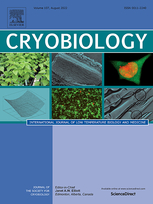
Cryoconservation de la cornée : une faible vitesse de refroidissement améliore la survie fonctionnelle de l'endothélium après congélation et décongélation.
Cryopreservation of cornea: a low cooling rate improves functional survival of endothelium after freezing and thawing.
Auteurs : ROUTLEDGE C., ARMITAGE W. J.
Type d'article : Article
Résumé
This study investigated the influence of low cooling rates on endothelial function and morphology of corneas frozen with propane-1,2-diol (PROH). Rabbit corneas were exposed to 1.4 mol/l (10% v/v) PROH, seeded to initiate freezing, and cooled at 0.2 or 1 °C/min to -80 °C. Corneas were frozen immersed in liquid or suspended in air. After being held overnight in liquid nitrogen, corneas were warmed at 1 or 20 °C/min. After stepwise removal of the cryoprotectant, the ability of the endothelium to control corneal hydration was monitored during normothermic perfusion. Morphology was assessed after staining and by specular microscopy during perfusion. Functional survival was achieved only after slow cooling (0.2 °C/min) with the cornea immersed in the cryoprotectant medium, and rapid warming (20 °C/min). These conditions also gave the best morphology after freezing and thawing. Cooling rates lower than those typically applied to cornea improved functional survival of the endothelium.
Détails
- Titre original : Cryopreservation of cornea: a low cooling rate improves functional survival of endothelium after freezing and thawing.
- Identifiant de la fiche : 2004-1439
- Langues : Anglais
- Source : Cryobiology - vol. 46 - n. 3
- Date d'édition : 06/2003
Liens
Voir d'autres articles du même numéro (3)
Voir la source
Indexation
-
Glycan profiling using a lectin microarray is a...
- Auteurs : ITAKURA Y., KIMURA M., GOJO S., et al.
- Date : 09/2011
- Langues : Anglais
- Source : Low Temperature Medicine - vol. 37 - n. 3
- Formats : PDF
Voir la fiche
-
Cryoconservation de l'îlot pancréatique de Lang...
- Auteurs : MORIYA H., YAMAGUCHI S.
- Date : 09/1999
- Langues : Japonais
- Source : Low Temperature Medicine - vol. 25 - n. 3
Voir la fiche
-
A morphological study of cooling rate response ...
- Auteurs : BISCHOF J., CHRISTOV K., RUBINSKY B.
- Date : 10/1993
- Langues : Anglais
- Source : Cryobiology - vol. 30 - n. 5
Voir la fiche
-
The effect of polyvinylpyrrolidone and the cool...
- Auteurs : MADDEN P. W., TAYLOR M. J., HUNT C. J., PEGG D. E.
- Date : 04/1993
- Langues : Anglais
- Source : Cryobiology - vol. 30 - n. 2
Voir la fiche
-
Abstracts of papers presented at the thirty-fou...
- Date : 12/1997
- Langues : Anglais
- Source : Cryobiology - vol. 35 - n. 4
Voir la fiche
